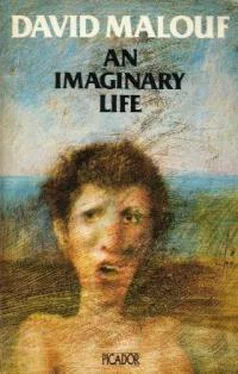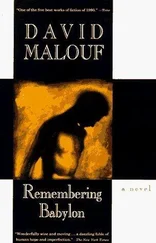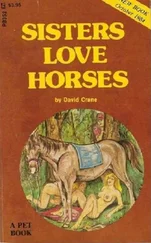The old man’s story is full of wonders. Is it, I ask myself, about a wolf? A bear? Some demon spirit? The young woman, who has heard all this before, watches the child in anticipation, laughing when he laughs and catching my eye so that I laugh too. When the old man’s voice evokes - what? - a wizard, one of the gods? - her fingers stop working a moment and her eyes darken.
Somewhere deep in myself I know this story. I have heard it before. In childhood. From one of our slaves perhaps, though in another language. It is the tune that I recognize. The old man’s voice weaves through the air as it darkens around us. We are moving into winter, into night. His hands, which are square and roughened, work steadily at the net. He is a craftsman. I recognize that. One sees immediately the sureness of his touch. He is too deeply absorbed in his story, in his working of the net, to be aware of us, except when the child laughs or touches his knee a moment in fear. I call him old, though we must be pretty much of an age, and I am not yet fifty. The harshness of his life, and the rigors of this place, have weathered and tanned and lined him so much that he has the appearance, to a Roman eye, of a man of seventy. Blocky, tough as I have never been, with his shaven head and whiskers, he has an air of stern nobility. I try to imagine his life, that must year after year have run parallel to my own, but no image appears. I cannot conceive of his childhood, or his youth, or picture the dead woman who was his wife, and whose grave outside the village I have seen him stop at once or twice on his way home from the harbor. His life, year after year, must have been just what I see now, work, sleep, work. And yet it seems mysterious to me, since what is not accounted for in it is his dignity, which makes me feel foolish and giddy. My life has been so frivolous. Brought up to believe in my own nerves, in restlessness, variety, change; educated entirely our of books, living always in a state of soft security, able to pamper myself, to drift about in a cloud of tender feelings, and with comfortable notions of my own intelligence, sociability, kindness, good breeding; moved by nothing that I couldn’t give a name to, believing in nothing I couldn’t see; never for a moment challenged by more than a clever boy can handle, who has learned early (too early perhaps) to turn all questions with elegance and a gloss of style - what can I know of the forces that have made this man, this tamer of horses, whose animal nature he somehow takes into himself and gentles? There is in his eyes, in his speech, in the power slowness with which he moves, something of the vast steppes from which they come, those horses, these tamers of horses, who when they die are not buried like other men but are left to ride above the earth in leagues of air.
Tomorrow I am to go with the old man’s hunting party to the birchwoods, where there are deer.
When we assemble in the little yard it is frosty, and there are stars, hard, pointed, hanging low overhead. We eat together at the bench: dishes of curd that have been thinned with water, warmed in a pot and sweetened with dark tasting honey. The bees are wild, grazing on herbs deep in the brush, and the honey has some of the bitterness of those mysterious plants, and gives the curds a fragrance that fills the nostrils before its sweet aftertaste comes to the palate. The effect is not pleasant until you get used to it. But I am hungry and accept a second dish with the rest.
We are barely finished when the others arrive, wearing strapped leggings, shirts laced open across the chest, and carrying bows. There are three youngish men, looking fierce with their dark whiskers and long hair, and one old man, diminutive and gray, who is the village shaman. Behind them in a noisy rabble are half a dozen barefoot children. My old man greets them, clasping hands with each in turn and embracing the shaman, who mutters words of blessing, not only to the old man but to each of the women, to the boy, to the benches, the doorposts, even to me.
We gather in a circle and fall silent. The boy goes off to where the pot stands warm in the yard, and his mother ladles into his hands a little of the curds we have eaten. The boy comes with it into the circle, and there is a stillness as the household demons assemble, creeping out from under the embers, from our empty bowls on the bench, from odd cracks and corners of the walls. The boy who is the center of all this looks nervous. His eyes move about the yard, from the fire to the bench, looking for the creatures whose interest for this moment is concentrated on him, on his cupped hands with their mixture of all the grains and weeds of the local fields, aware that he is, for the brief period of the ceremony, no longer himself - the youngest member of the household, a pudgy seven-year-old, more than usually spoiled and mischievous - but a conductor of dark forces, an embodiment of the house itself, breathing heavily in the silence, trembling, holding out to be tasted by invisible mouths the meager fruits of the earth.
The shaman begins to sing and is joined by the rest. The boy stiffens and shakes. When a little of the gruel spills from his hands, and after a moment’s doubt he lowers his head to lick it, the old man, without ceasing his chant, clips the boy lightly over the ear. The gruel drips, and one of the young men, motioning to the boy that he is not to be blamed, draws the earth over it with this boot. The chanting ceases. We stand quiet. The boy’s eyes shift anxiously and I see them move quickly to his mother, who nods, and then to his grandfather, who pats him lightly on the head. He turns stiffly, and we watch him, very carefully now, bearing his cupped hands before him, walk slowly back to the pot and spill the remains of the gruel on the fire. Which hisses. And with that, the circle breaks. Everyone laughs and begins talking at once, the yard is filled with activity as the men move away to resume their bows, the woman cleans the child’s hands with a cloth, the two old men joke and slap one another’s shoulders. All the signs, it seems, are propitious. We can go. The horses - short, stocky beasts, with wooden saddles covered with cloth - are brought round now to the palisade entrance and we mount. The old man, who is a little ashamed for me in front of his neighbors, shows me how to ride without stirrups, by gripping the horse’s flanks with my knees, and the younger men, out of politeness, busy themselves with their saddle straps. One of them whistles, looking away over the river flats to where the sun is just a wash of pale light on the eastern horizon, diffused and glowing in the mist. We ride down out of the village. The ground towards the marshes is white with frost, and our hooves as we pass leave big prints that immediately break up and spread, as if gigantic horsemen, like the ones in my dream, were walking invisibly behind us, placing their hooves very carefully in our tracks. Mist swirls in off the flats, round the breasts of our horses, round our knees. We might be wading through clouds. But high up there is yellow light, broken with ribs of cloud wrack, and the birds are singing. Half an hour later, with the sun high over the brush woods, a single red ball, the air is still cloudlike, thinning on the rises but as thick as surf when we dip down into the hollows. We move slowly, the horses plashing through tussocky swamp, breathing heavily as we push uphill. All the land above the river flats is uneven, and we must keep to the uplands because the marshes are still flooded after the summer rains. At last the mist begins to disperse. We have come out into a sparsely wooded landscape, all whitened stalks and spear like grass heads, that is lighted gold and brown in the early sun. Rabbits tumble away from us in the brush, and the men laugh and halloo as the little white tails bob away. We are climbing now towards a wooded plateau beyond an outcrop of split rocks, that might, in another world, have been an old fortification. We push steeply up between the rearing granite walls, and at the head of the file I hear the first of the horses gallop away into what must be a clearing. Then as I come over the last of the grassy rise, with the horse very nearly slipping under me, I see. It is a huge natural circle. The first of the horsemen has stopped about thirty yards off, and each of the others gallops up beside him. Then together, in line, they ride into a screen of pines blown ragged in the wind, with me just a little behind, since I realize that in coming up here we have made a detour; some ritual is being enacted in which I have no part. We move into the screen, over a carpet of soft needles, and the horses' hooves stir up their scent.
Читать дальше












